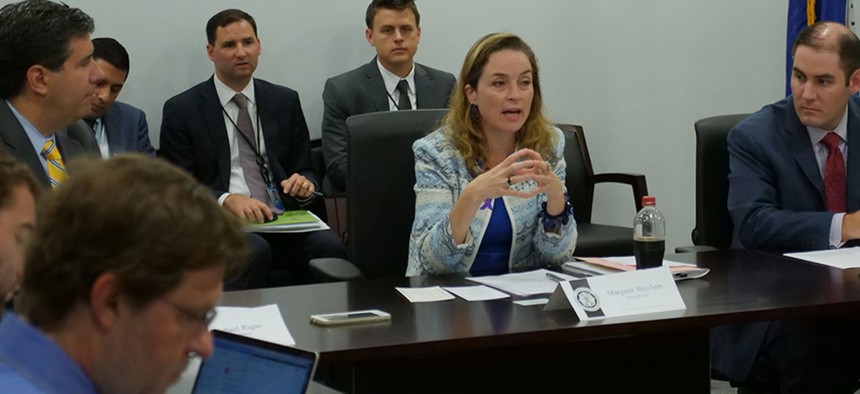
Acting OPM Director Margaret Weichert in October announced steps she is taking to boost recruitment and retention. Weichert's memo this week encouraged agencies to continue implementing the administration's workforce priorities. OPM
OPM to Agencies: ‘Be Mindful’ of Policies in Trump’s Workforce Orders Despite Court Ruling
Memo to agency leaders acknowledges injunction on key portions of three workforce orders, but encourages agencies to pursue the administration’s priorities through collective bargaining negotiations.
Office of Personnel Management acting Director Margaret Weichert on Thursday issued new guidance for agencies to implement three controversial executive orders, despite the fact that their key provisions were struck down in federal court in August.
In a memo to agency leaders, Weichert acknowledged that provisions making it easier to fire federal employees, setting time limits on collective bargaining negotiations, and restricting grievances and the use of official time were ruled unlawful by U.S. District Judge Ketanji Brown Jackson last summer. But she encouraged agencies to continue to pursue the spirit of those executive orders in their ongoing negotiations for new contracts with federal employee unions.
The Justice Department is in the process of appealing that decision to the U.S. Court of Appeals for the D.C. Circuit, although its request to expedite the case was denied. The government’s opening brief is due Dec. 7, and unions’ response will be due in February.
“As noted in OPM’s preliminary guidance, the court’s decision does not limit or otherwise modify agency or union collective bargaining rights and obligations under the Federal Service Labor-Management Relations Statute,” Weichert wrote. “This includes the agency’s right to make proposals in the context of collective bargaining, including over subjects that were discussed in the executive orders, and to fashion those proposals in a manner that best reflects critical agency priorities.”
In the weeks following the court ruling, unions reported that several agencies continued to push forward with efforts to enshrine the provisions of the executive orders in collective bargaining agreements, simply claiming that they were offering the proposals “independently” of the presidential edicts. Thursday’s guidance appears to give a retroactive green light to agencies that have taken this approach, highlighting the goals of the executive orders in a general sense, if not the specific provisions invalidated by court order.
“In crafting their bargaining proposals, agencies should also be mindful of the policies set forth in [the executive orders] with respect to the effective functioning of the executive branch,” Weichert wrote. “Among other things, these policies favor limiting opportunity periods to demonstrate acceptable performance [before an employee is fired]; not requiring supervisors to use progressive discipline; and ensuring that taxpayer-funded union time is authorized in amounts that are reasonable, necessary, and in the public interest.”
Weichert also reiterated that agencies must “negotiate in good faith” as required by law. But unions have reported a rise in perfunctory collective bargaining negotiations by management. Officials at the National Treasury Employees Union have said that at the Health and Human Services Department, agency leaders engaged in one day of negotiations before calling in mediation services, and then after one day of mediation, they declared an impasse and forwarded their proposal to the Federal Service Impasses Panel.
In a statement Friday, NTEU National President Tony Reardon dismissed the new guidance as merely restating aspects of the executive orders that were not overturned.
“The additional guidance from the Office of Personnel Management on the implementation of the president’s May 25 executive orders is simply a restatement of the provisions of those orders that were not struck down by a federal judge in August,” Reardon said. “One thing is abundantly clear, however. Federal agencies have a requirement to bargain in good faith with federal unions. That standard is established in federal law and NTEU intends to hold agencies to that statutory obligation.”







